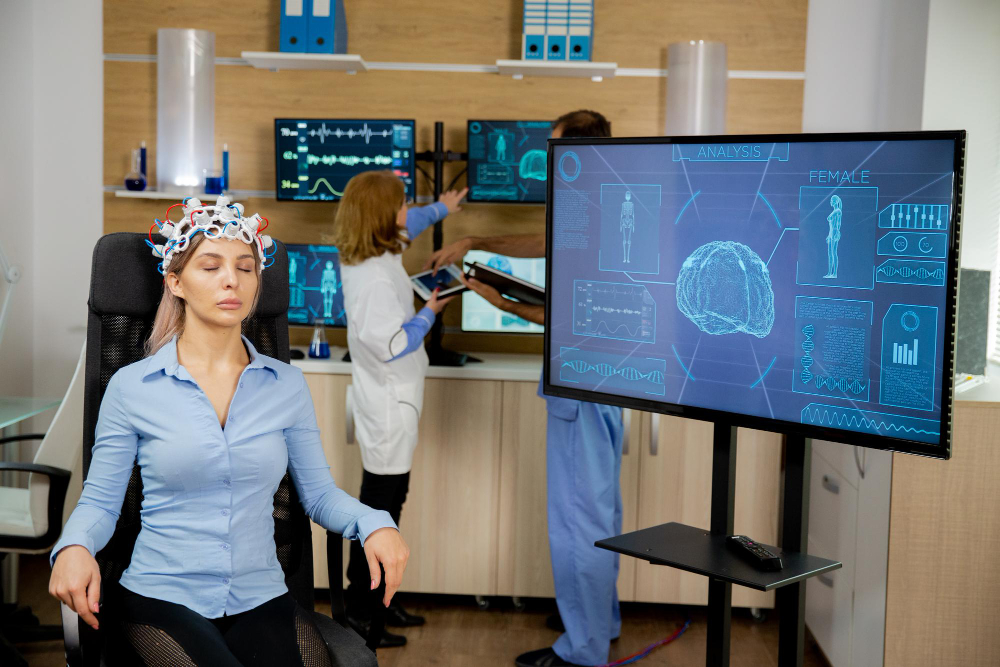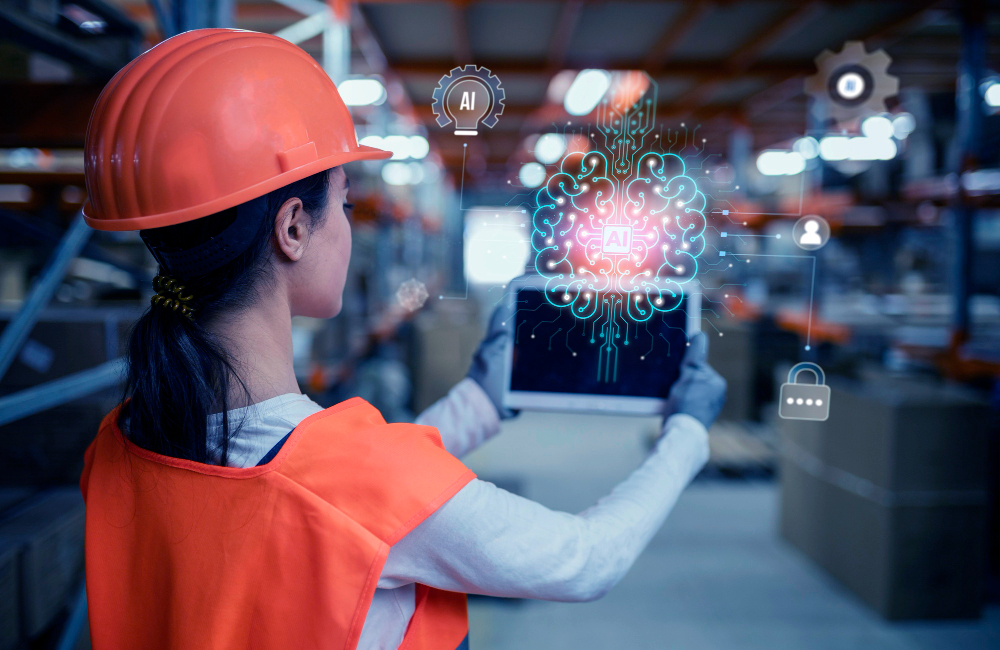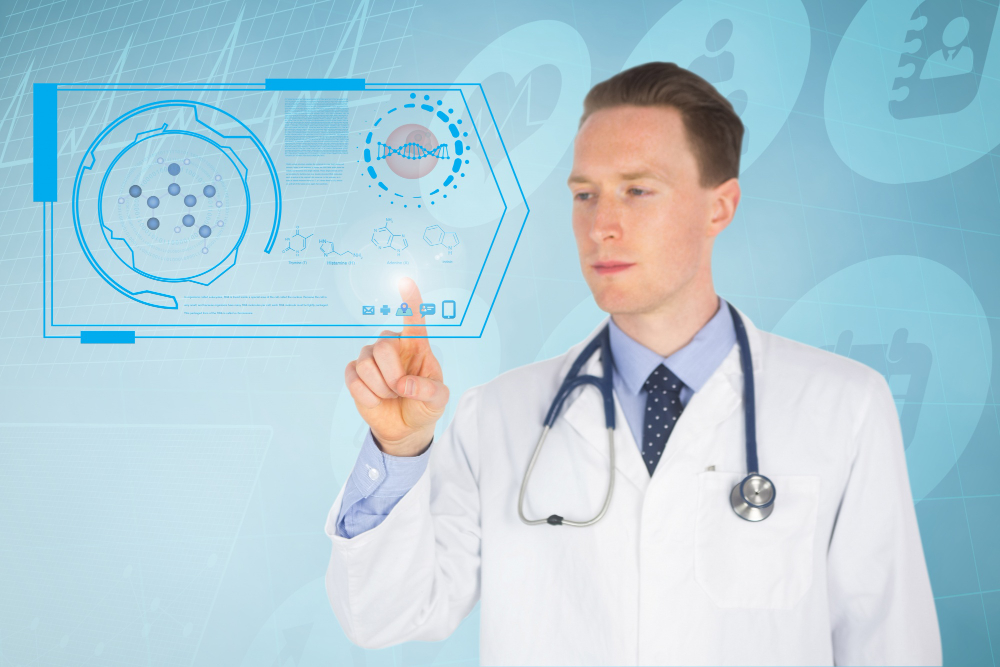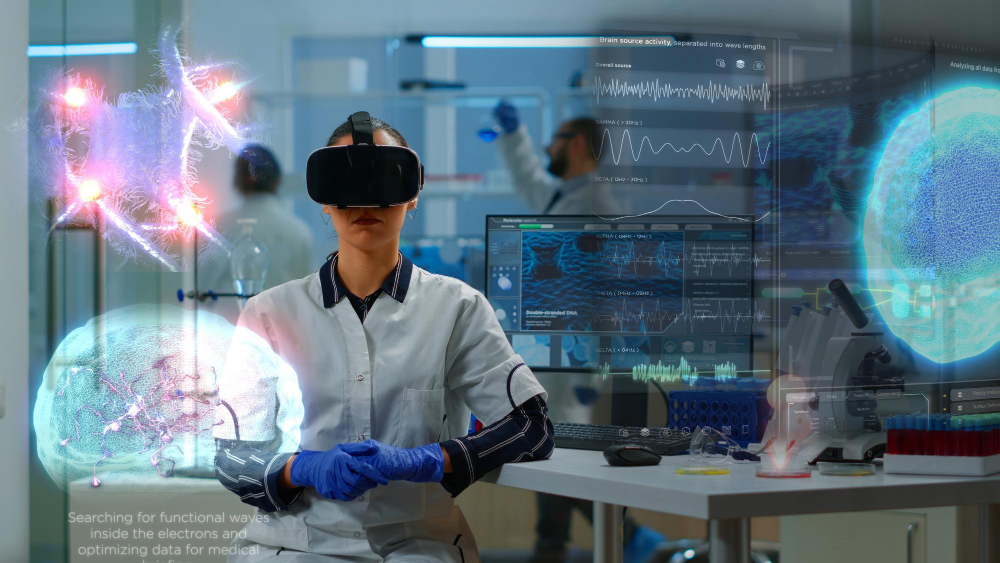
Generative AI in Healthcare: Revolutionizing Patient Care
The dawn of the 21st century has witnessed an unprecedented convergence of cutting-edge technology and the intricate realm of healthcare. At the forefront of this intersection stands Generative AI, a transformative force poised to redefine how we approach patient care.
In this introduction, we embark on a journey to unravel the multifaceted landscape of Generative AI in healthcare, exploring its profound implications and the exciting prospects it holds for the future of medicine.

As we delve into the intricate tapestry of Generative AI, it’s essential to grasp its essence. This technology goes beyond mere automation; it possesses the unique ability to generate new data, breathing life into the realm of artificial intelligence. In the context of healthcare, Generative AI emerges as a beacon of innovation, promising not just incremental improvements but a paradigm shift in how we diagnose, treat, and understand health.
Our exploration begins with a foundational understanding of Generative AI and its seamless integration into the fabric of healthcare. We’ll unravel the complexities, demystifying how this intelligent force is ushering in a new era of diagnostics, treatment personalization, and drug discovery.
Advancements of Healthcare with AI
In the dynamic landscape of healthcare, the infusion of artificial intelligence (AI) has ushered in a new epoch, where unprecedented advancements redefine the very essence of patient care. This section aims to unravel the multifaceted tapestry of AI-driven progress in healthcare, delving into intricacies that illuminate the transformative impact on diagnostics, treatment personalization, and drug discovery.

Also Read:- Therapy Machines for Back Pain : Comprehensive Guide
Improved Diagnostics
The marriage of healthcare and AI has birthed a paradigm shift in diagnostics, catapulting accuracy and efficiency to unprecedented heights. Generative AI, a formidable subset of AI, demonstrates an unparalleled ability to analyze vast datasets, decode intricate medical imagery, and discern subtle patterns invisible to the human eye.
Picture a scenario where diseases are not just diagnosed but predicted with remarkable precision. Generative AI, through its analytical prowess, empowers healthcare professionals to identify anomalies at the earliest stages, paving the way for proactive and targeted interventions. The synergy between AI and diagnostics is not merely enhancing our understanding of diseases; it’s fundamentally altering the trajectory of healthcare by prioritizing prevention over reaction.
Personalized Treatment Plans
The concept of personalized medicine, long an aspiration in the medical realm, is now a tangible reality through the integration of AI. Generative AI, with its ability to assimilate and interpret diverse patient data, transcends the limitations of traditional approaches. Genetic information, lifestyle factors, and historical health records converge to inform treatment plans that are as unique as the individuals they are crafted for.
This isn’t just about treating diseases; it’s about orchestrating a symphony of interventions that resonate with the intricacies of an individual’s biology. Generative AI empowers healthcare practitioners to move beyond generalized prescriptions, paving the way for treatments that are precisely tailored to the nuances of each patient. The result? Enhanced efficacy, minimized side effects, and a quantum leap in the quality of patient care.
Drug Discovery and Development
In the realm of pharmaceuticals, AI emerges as a game-changer, accelerating drug discovery and development to previously unimaginable speeds. Generative AI’s computational prowess sifts through colossal datasets, expediting the identification of potential drug candidates and refining the arduous journey from laboratory discovery to clinical application.
Imagine a landscape where the development of life-saving medications isn’t constrained by prohibitive timelines and exorbitant costs. Generative AI’s role in drug discovery heralds a future where innovative treatments can swiftly navigate from concept to market, offering hope to patients in need. This confluence of AI and pharmaceuticals isn’t just about efficiency; it’s about rewriting the narrative of accessibility, ensuring that groundbreaking treatments reach those who need them most.
Also Read:- Liver Infection Symptoms and Its Treatment
As we navigate the intricate landscape of healthcare in AI, it becomes evident that we stand at the cusp of a transformative era. The advancements detailed in this section transcend the boundaries of conventional healthcare, ushering in an age where intelligence fuels innovation and patient care is defined by precision, personalization, and possibilities that extend beyond the realms of imagination.
Applications of Generative AI in Healthcare

The integration of Generative AI into the healthcare landscape heralds a profound shift in how we approach medical challenges. This section serves as an in-depth exploration of the diverse and transformative applications of Generative AI, unveiling its capacity to revolutionize medical imaging, navigate electronic health records with finesse, and predict patient outcomes through the lens of advanced analytics.
Medical Imaging
Generative AI’s impact on medical imaging is nothing short of revolutionary. Traditionally, interpreting complex images such as X-rays, MRIs, and CT scans required a keen eye and years of experience. Enter Generative AI, with its ability to discern intricate patterns and anomalies that might elude even the most seasoned human eye.
This application transcends mere image interpretation; it’s a paradigm shift in diagnostics. From identifying subtle abnormalities to predicting disease progression, Generative AI empowers healthcare professionals with a level of precision that can redefine the early detection of conditions. Imagine a scenario where medical imaging isn’t just a diagnostic tool but a predictive force, offering insights that enable proactive and targeted interventions.
Natural Language Processing in Electronic Health Records
In the labyrinthine world of Electronic Health Records (EHRs), Generative AI emerges as a guiding light. Natural Language Processing (NLP) capabilities enable this technology to decipher the nuances of textual medical data, extracting valuable insights with unprecedented efficiency.
Consider the vast amount of information embedded in patient records — a treasure trove of data waiting to be unlocked. Generative AI navigates through this sea of information, offering healthcare providers a comprehensive understanding of a patient’s medical history, treatment trajectories, and potential risk factors. This isn’t just about efficiency; it’s about empowering clinicians with the tools to make well-informed decisions, minimizing guesswork, and maximizing the precision of patient care.
Predictive Analytics for Patient Outcomes
Generative AI’s foray into predictive analytics is akin to peering into the future of patient care. By leveraging advanced algorithms and machine learning, this technology sifts through diverse datasets to anticipate patient outcomes, guiding healthcare professionals in their decision-making processes.
Imagine being able to identify potential complications before they manifest, allowing for proactive interventions that can alter the course of a patient’s journey. From predicting readmission risks to foreseeing the efficacy of specific treatments, Generative AI’s predictive analytics aren’t just statistical projections; they are tools that empower healthcare providers with foresight, ensuring that patient care is not just reactive but anticipatory.
Also Read:- Face and Body Test: Navigating the Depths of Holistic Health Assessment
As we navigate through these applications, it becomes apparent that Generative AI isn’t merely a technological appendage to healthcare; it’s an integral force shaping its future. The applications detailed in this section represent not just advancements but a paradigm shift in how we perceive and practice healthcare. Generative AI isn’t just a tool; it’s a beacon illuminating the path to a future where medical innovation is synonymous with precision, efficiency, and a profound understanding of the complexities inherent in human health.
Challenges and Ethical Considerations of AI in Healthcare

The infusion of Artificial Intelligence (AI) into the healthcare domain brings forth a wave of transformative possibilities, but with great power comes an equal measure of responsibility. This section delves into the intricate landscape of challenges and ethical considerations that accompany the integration of AI in healthcare, addressing issues ranging from data privacy and bias to the labyrinth of regulatory compliance.
Data Privacy and Security
At the forefront of challenges in AI in healthcare lies the critical concern of data privacy and security. With Generative AI relying heavily on vast datasets, the sensitivity of patient information becomes paramount. Safeguarding this treasure trove of data against unauthorized access, breaches, and cyber threats is not just a regulatory requirement but an ethical imperative.
In a world where information is currency, the onus is on healthcare institutions and AI developers to implement robust encryption measures, stringent access controls, and proactive security protocols. The challenge is not merely technical; it’s a delicate balance between harnessing the power of data for medical advancement and ensuring the sanctity of patient privacy.
Bias in AI Algorithms
The specter of bias haunting AI algorithms is a challenge that demands our unwavering attention. Generative AI, like any technology, learns from the data it is fed. If this data carries inherent biases, whether racial, gender-based, or socio-economic, the algorithms can perpetuate and even exacerbate these biases in medical decision-making.
Addressing bias in AI requires a multi-faceted approach. It involves curating diverse and representative datasets, implementing transparency in algorithmic decision-making, and continuously auditing and refining the models. The challenge is not just technical refinement; it’s a call for a conscientious and ethical approach to developing AI systems that prioritize fairness and equity in healthcare outcomes.
Regulatory Compliance
The intersection of AI and healthcare is a regulatory maze that demands meticulous navigation. Compliance with a myriad of healthcare regulations, data protection laws, and ethical standards is not just a hurdle; it’s an imperative for the responsible deployment of AI in healthcare settings.
From the Health Insurance Portability and Accountability Act (HIPAA) in the United States to the General Data Protection Regulation (GDPR) in Europe, the challenge lies in harmonizing AI applications with existing regulatory frameworks. This involves not just understanding the legal requirements but actively participating in shaping ethical guidelines that safeguard patient rights and ensure the responsible use of AI in healthcare.
Also Read:- Health Tips for Adults: A Guide to a Fulfilling and Healthy Life
As we grapple with these challenges, the ethical considerations surrounding AI in healthcare become paramount. It’s a call for a proactive and transparent approach that places patient well-being and ethical practice at the forefront of AI development and deployment. In the complex tapestry of challenges and ethical considerations, the journey towards harnessing the full potential of AI in healthcare is not just about overcoming hurdles but about forging a path that prioritizes the sanctity of patient information, fairness in decision-making, and adherence to the highest standards of ethical conduct.
Success Stories of AI in Healthcare

The integration of Artificial Intelligence (AI) into the healthcare domain is not just a promise of future advancements; it’s a testament to the transformative impact that is already underway. This section unfolds a series of compelling success stories, illustrating how Generative AI has become a catalyst for positive change, redefining patient care, and instilling hope in the face of medical challenges.
Real-Life Examples of Generative AI Impacting Healthcare
Early Detection of Rare Diseases: In a groundbreaking success, Generative AI algorithms have demonstrated an exceptional ability to identify rare diseases in their early stages. Through the analysis of diverse and complex datasets, these algorithms have flagged subtle patterns indicative of rare conditions, enabling healthcare professionals to initiate interventions before symptoms escalate.
Optimizing Treatment Plans for Cancer Patients: Generative AI’s prowess in personalizing treatment plans has been exemplified in oncology. By delving into patient genetics, treatment responses, and historical data, AI-driven models can recommend tailored cancer treatment strategies. This not only enhances the effectiveness of therapies but minimizes the side effects, improving the overall quality of life for cancer patients.
Enhanced Radiology Interpretation: Radiology interpretation has witnessed a paradigm shift with the incorporation of Generative AI. These systems excel in deciphering intricate imaging scans, leading to more accurate and timely diagnostics. From identifying subtle anomalies in X-rays to providing detailed insights from MRIs, AI is augmenting the capabilities of radiologists, offering a new level of precision in medical imaging.
Patient Testimonials and Experiences
Sarah’s Journey with AI-Enhanced Diagnostics: Sarah, a 32-year-old mother, faced persistent health issues that baffled traditional diagnostic methods. Generative AI, however, analyzed her extensive medical history, genetic markers, and imaging data to unveil a rare condition. Early detection through AI not only saved precious time but paved the way for a targeted treatment plan, significantly improving Sarah’s prognosis.
John’s Personalized Cancer Treatment: John, diagnosed with a rare form of cancer, found solace in Generative AI’s ability to personalize treatment. By comprehensively analyzing his genetic makeup and treatment responses, AI recommended a tailored therapeutic approach. This not only increased the efficacy of the treatment but minimized adverse effects, allowing John to navigate his cancer journey with greater resilience.
Also Read:- 10 Best Universities for Clinical and Public Health Nutrition In India
These success stories underscore the tangible impact of Generative AI in reshaping healthcare narratives. From unlocking the mysteries of rare diseases to personalizing cancer treatments, AI is not just a technological marvel; it’s a beacon of hope for patients and a valuable ally for healthcare professionals. As we delve into these narratives, it becomes evident that the integration of AI in healthcare is not a distant promise—it’s a present reality, enriching lives and rewriting the possibilities of patient care.
Future Trends of Generative AI in Healthcare

As we stand on the precipice of healthcare transformation, the future trends of Generative AI promise a journey into uncharted territories, where innovation is poised to redefine the very fabric of patient care. This section unravels the emerging trends that are set to shape the landscape of Generative AI in healthcare, offering a glimpse into a future characterized by continuous advancements, breakthroughs, and a revolution in medical possibilities.
Continuous Advancements in Generative AI
The trajectory of Generative AI in healthcare is marked by a relentless pursuit of excellence. As technology evolves, so does its capacity to generate new data, interpret complex medical information, and contribute to innovative solutions. Continuous advancements in Generative AI algorithms will further refine diagnostic accuracy, treatment personalization, and the overall efficiency of healthcare processes.
The future holds the promise of more sophisticated models capable of handling increasingly diverse and voluminous datasets. These models will not only enhance their predictive capabilities but also adapt dynamically to the evolving landscape of medical knowledge. The integration of Generative AI as a core component of healthcare workflows will become more seamless, revolutionizing how healthcare professionals approach diagnostics, treatment planning, and patient care.
Potential Breakthroughs in Healthcare
Beyond continuous advancements, the future of Generative AI in healthcare harbors the potential for groundbreaking discoveries that could redefine the boundaries of medical science. From uncovering novel biomarkers for diseases to contributing to the development of previously elusive treatments, Generative AI holds the key to unlocking new frontiers in healthcare.
Anticipated breakthroughs include more precise predictive models, enabling earlier and more accurate identification of diseases. The technology may also play a pivotal role in unraveling the complexities of rare conditions, offering insights that could lead to targeted therapies and, in some cases, cures. Additionally, Generative AI is poised to contribute significantly to the field of drug discovery, accelerating the development of innovative medications and reducing the associated time and costs.
Integration of Generative AI into Everyday Healthcare Practices
The future envisions Generative AI seamlessly integrated into the fabric of everyday healthcare practices. From routine diagnostics to treatment planning, Generative AI will become a trusted companion for healthcare professionals, enhancing their decision-making processes and providing valuable insights in real-time.
Imagine a scenario where Generative AI collaborates with physicians in real-time during medical procedures, offering instant analysis and guidance. This integration holds the potential to democratize access to advanced healthcare, bringing the benefits of Generative AI to diverse healthcare settings globally. The future trend is not just about the technology’s sophistication but its accessibility and practical integration into the day-to-day operations of healthcare institutions.
Advancements in Patient-Centric Technologies
The future of Generative AI in healthcare extends beyond clinical applications to embrace patient-centric technologies. From virtual health assistants powered by Generative AI to personalized health apps, patients will become active participants in their healthcare journeys, empowered by the insights and recommendations generated by these intelligent systems.
Patients may receive personalized health forecasts, enabling them to proactively manage their well-being. Telemedicine experiences could be enriched by Generative AI, providing more accurate remote diagnostics and treatment recommendations. This patient-centric approach represents a paradigm shift in healthcare, where individuals are not just recipients of care but active partners in leveraging advanced technologies for their health.
Also Read:- Best Foods for Diabetic Patients: Nourishing Your Health
In navigating the future trends of Generative AI in healthcare, the trajectory is clear: a path paved with continuous advancements, potential breakthroughs, seamless integration into healthcare practices, and a shift towards patient-centric technologies. The journey promises not just innovation but a fundamental transformation in how we perceive and experience healthcare, with Generative AI at the forefront of this revolutionary evolution.
Frequently Asked Questions
What is Generative AI, and how does it differ from traditional AI in healthcare?
Generative AI is a subset of artificial intelligence focused on creating new data, such as images, texts, or sounds. In healthcare, it goes beyond traditional AI by actively contributing to personalized treatment plans, diagnostics, and drug discovery.
How does Generative AI ensure patient data privacy and security?
Robust measures, including encryption and compliance with data protection regulations, are implemented to safeguard patient data and ensure privacy and security.
Can Generative AI completely eliminate bias in healthcare algorithms?
While efforts are made to mitigate bias through diverse training datasets, complete elimination remains a challenge. Continuous monitoring and improvements are necessary to address biases effectively.
What are the current regulatory frameworks governing the use of Generative AI in healthcare?
Various regulatory frameworks exist, depending on the region. Compliance with healthcare regulations and standards, such as HIPAA, is essential to ensure ethical and legal use.
How can patients benefit from Generative AI in their healthcare journey?
Patients can benefit from more accurate diagnostics, personalized treatment plans, and advancements in drug discovery, leading to improved overall outcomes and a better healthcare experience.
VII. Conclusion of Generative AI in Healthcare
As we draw the curtains on our exploration of Generative AI in healthcare, the concluding chapter unveils a vision of healthcare transformed. Generative AI has emerged not merely as a technological innovation but as a harbinger of a new era in patient care—one marked by precision, personalization, and unprecedented possibilities.
The journey through the intricacies of Generative AI’s impact on healthcare has revealed a tapestry woven with advancements that extend beyond the conventional boundaries of diagnostics, treatment, and drug discovery. From the revolutionary capabilities in medical imaging to the profound insights derived from electronic health records and the foresight offered by predictive analytics, Generative AI stands as a beacon of innovation, reshaping the landscape of healthcare in profound ways.
The success stories, both anecdotal and data-driven, illuminate the tangible benefits experienced by individuals whose lives have been touched by the transformative power of Generative AI. It’s not merely about algorithms and data; it’s about Sarah, John, and countless others who have faced medical uncertainties with newfound hope, empowered by a technology that transcends the limits of traditional approaches.
However, this transformative journey is not without its challenges and ethical considerations. Navigating the delicate balance between harnessing the potential of Generative AI and safeguarding patient privacy, addressing biases, and ensuring regulatory compliance demands a conscientious approach from both developers and healthcare practitioners. The challenges posed are not roadblocks but opportunities for responsible innovation, shaping an ethical framework that upholds the sanctity of patient information and the principles of fairness in healthcare outcomes.
As we peer into the future trends of Generative AI in healthcare, the possibilities are both exhilarating and profound. Continuous advancements promise a journey of perpetual refinement, with breakthroughs on the horizon that could redefine the landscape of medical science. The integration of Generative AI into everyday healthcare practices and the emergence of patient-centric technologies signify a paradigm shift where individuals become active participants in their health journeys, guided by the insights and recommendations of intelligent systems.
Generative AI in healthcare is not just a technological marvel; it’s a catalyst for a vision where patient care transcends the realms of tradition. It’s about a future where diseases are detected before symptoms manifest, treatments are personalized with surgical precision, and the patient experience is enriched by the seamless integration of advanced technologies. The revolution has begun, and as we step into this new era of healthcare, one thing is certain: the impact of Generative AI is not just a chapter in medical history but the prologue to a narrative of innovation, resilience, and a redefined vision for the well-being of individuals and communities.
May I request that you elaborate on that? Your posts have been extremely helpful to me. Thank you!
Definitely, what a fantastic website and informative posts, I surely will bookmark your website.All the Best!
Valuable info. Lucky me I found your web site by accident, and I am shocked why this accident did not happened earlier! I bookmarked it.
I’ll recently started a web site, the info you offer on this website has helped me tremendously. Thanks for all of your time & work.